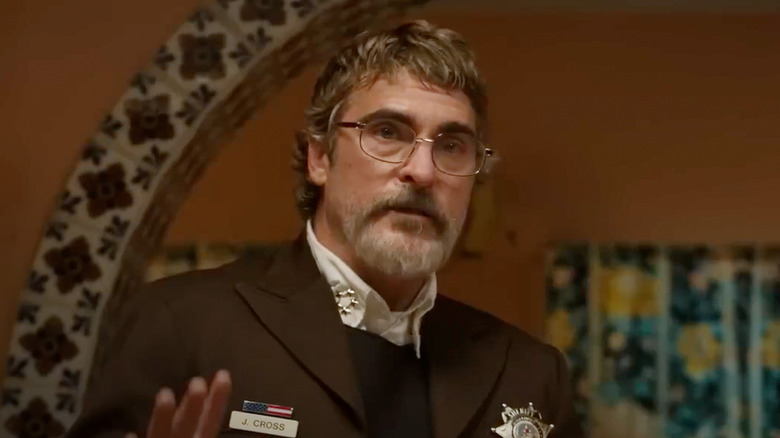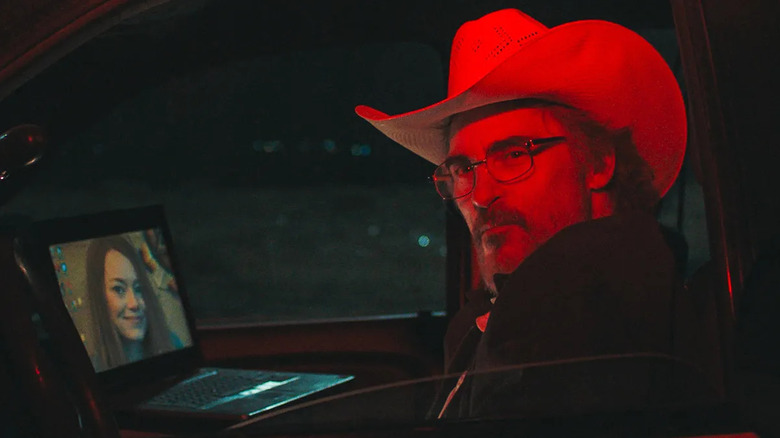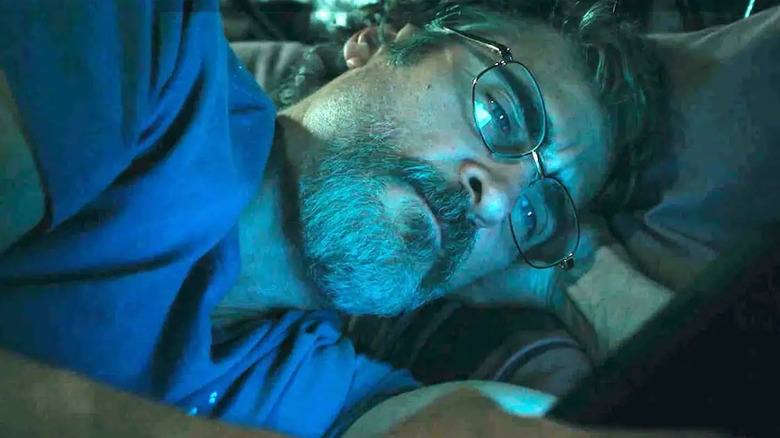Eddington Is 2025's Most Divisive, Provocative & Infuriating Movie — But That's The Point
This article contains spoilers for "Eddington."
When the attack on Pearl Harbor happened in 1941, the media galvanized the tragedy into a general national mood of patriotism, and got the majority of the country on board to stop the Axis powers. This was what the George W. Bush administration and others attempted to do in the aftermath of the September 11th Attacks, only it wasn't just Osama Bin Laden they targeted, but Iraq as well. From my perspective as an Elder Millennial, it seems to me that American culture irreparably began to break after 9/11. The cognitive dissonance of that choice only increased given our access to the internet, a tool that allowed all of us the ability to learn and investigate for ourselves. Thanks to the tragic event mixed with a brand new wellspring of information at our fingertips, the possibility of a prevailing narrative was greatly diminished, and things felt increasingly too complex and uncertain for the average citizen to bear.
Thus began the early days of the criticism "too soon," something which existed in uncomfortable opposition with the rallying cry, "Never Forget." America criticizing itself was simpler when there was a self-admittedly corrupt individual like Richard Nixon to shoulder the bulk of the blame, and the 1990s had seen the country grow so complacent with corruption looking more like a soap opera scandal that the impeachment of Bill Clinton seems quaint today. The response to 9/11 was an emotionally unhealthy one — while our leaders manipulated our trauma into fulfilling their desires, ordinary people were torn between trying to face the issues head-on or trying to suppress them. A wave of films seeking to deal with 9/11 directly — from "United 93" to "World Trade Center" — made a cultural blip, but still felt easy to ignore for the sort of folks who earnestly raised the possibility of scrubbing the Twin Towers from old films and TV shows.
In other words, America has had major issues with taking a hard look at itself for decades. That's abundantly clear given the early responses to Ari Aster's "Eddington," a new movie which is set in 2020, another culturally turbulent year in our history. Already, people are calling it everything from an irresponsible film to using that old standard, "it's too soon." Frankly, it's not too soon; never has been. Instead, Aster's film, deliberately provocative and even infuriating as it may be, is working exactly as intended.
'Eddington' explores politics and sociology through a genre lens
So far, the most common criticism of "Eddington" is that it is a "both sides" film. One can see where this critique is coming from, as most satires poke fun at both sides of an issue. Mike Judge's "Idiocracy" is a film whose political leanings feel generally liberal but whose jokes make sure to indict people on the left as much as the right, resulting in a film that comes off as libertarian. Judge's aim is not to be a political commentator but a satirist, and his work making fun of both sides is merely him being a responsible satirist. There are glimpses of such satire leading to libertarianism in "Eddington," to be sure. Even so, one must appreciate the subtle yet key difference in Aster's approach to the material. Instead of merely looking to make everyone look equally foolish (or insane), Aster uses the trappings of the Western and noir genres to send up America in microcosm. There's a marked difference between "both sides are equally insane" and "everyone has become insane," with "Eddington" intending the latter message.
Despite Aster deliberately setting "Eddington" in 2020 and utilizing numerous bits of real-life history within the film, it's important to remember that the movie is as much a genre parable as something more obviously allegorical like "Bad Day at Black Rock" or "L.A. Confidential." Even the work of the Coen brothers — to which "Eddington" is being compared — is typically more absurdist. Aster dabbles in absurdism in his films, but he's generally operating as a surrealist. "Hereditary" and "Midsommar" hijacked the horror movie structure to allow Aster to send his protagonists from a place of relative normality into a surreal hell, and his last film, "Beau Is Afraid," began with that surrealism surrounding the hapless main character from the start.
"Eddington" emulates Aster's horror pictures in its structure, yet while the film and the characters end up descending into an insanity that becomes the new normal, it's not solely the outside forces who are to blame. Like a traditional (or even a revisionist) Western, the whole town is directly responsible for the events that transpire. Even more than that, Joe Cross (Joaquin Phoenix), who conceives of himself as a stalwart lawman, is portrayed like the sap in any given noir, a man with disreputable morals who gets in over his head. Of course, this blend of Western and noir tropes would make for an infuriating watch for those viewers looking for an escapist experience, and that's before one adds all the real-life issues swirling around "Eddington," that just five years later are hardly resolved.
A clue hidden in plain sight points to the real purpose of 'Eddington'
Aster is not a hand-holding type of filmmaker. That said, he's not unfair, either, as his movies all tend to contain clues to unlock the answers to the film's plot, backstory, subtext, themes, and so on. The sly trick of "Eddington" is that, given its roots in our recent history, it feels at first like a movie that doesn't require such decoding. We've all become so used to seeing the unimaginable and untenable become reality that Aster doesn't have to push so hard to make his satire apparent. If Aster's prior movies were about a realistic character falling into an increasingly surreal world, "Eddington" rightfully acknowledges that a surreal world is already here; we've already been living in an Asteresque landscape since 2020 (at least).
There is indeed a clue hidden within "Eddington" in plain sight, one which helps explain the subtextual aims of the film. During the movie, both Joe and his rival for mayor, the incumbent candidate Ted Garcia (Pedro Pascal), disagree on the proposal by a fictional tech company, SolidGoldMagiKarp, to build a huge data center in the middle of Eddington. Joe is worried that the big business will destabilize the town and be bad for its resources and the environment, whereas Ted has positioned himself as a candidate for progress and believes the tech giant will be a boon to Eddington. It seems like SolidGoldMagiKarp is a stand-in for Big Tech and the way that it has capitalized on society's strife to gain a foothold within just about every industry as some sort of false savior. While this is certainly true, Aster named the company after a real-life term that refers to an error in AI language models. The error "leads to unexpected or erratic outputs," as one article explains, and these anomalies "cause models to behave unpredictably."
Thus, the encroachment of SolidGoldMagiKarp in "Eddington" is a metaphor for the entire American model to "behave unpredictably" as it breaks down. Hence the reason why the film concludes on the data center being built, overseen by a now paraplegic and mute Joe, who has become a literal puppet for the system. The movie's final shot, which the end credits roll over, is of the SolidGoldMagiKarp data center shining in the middle of the otherwise dark town at night, like a metastasized tumor. If "Eddington" and its depiction of a feeble, insane, hateful, manipulative, ignorant, and bigoted American town provokes or infuriates you — good, because you, like me and like all of us, could probably use some more motivation to action.
It should never be "too soon" for us to explore our realities and acknowledge our faults, because if we don't, then it'll be too late.


